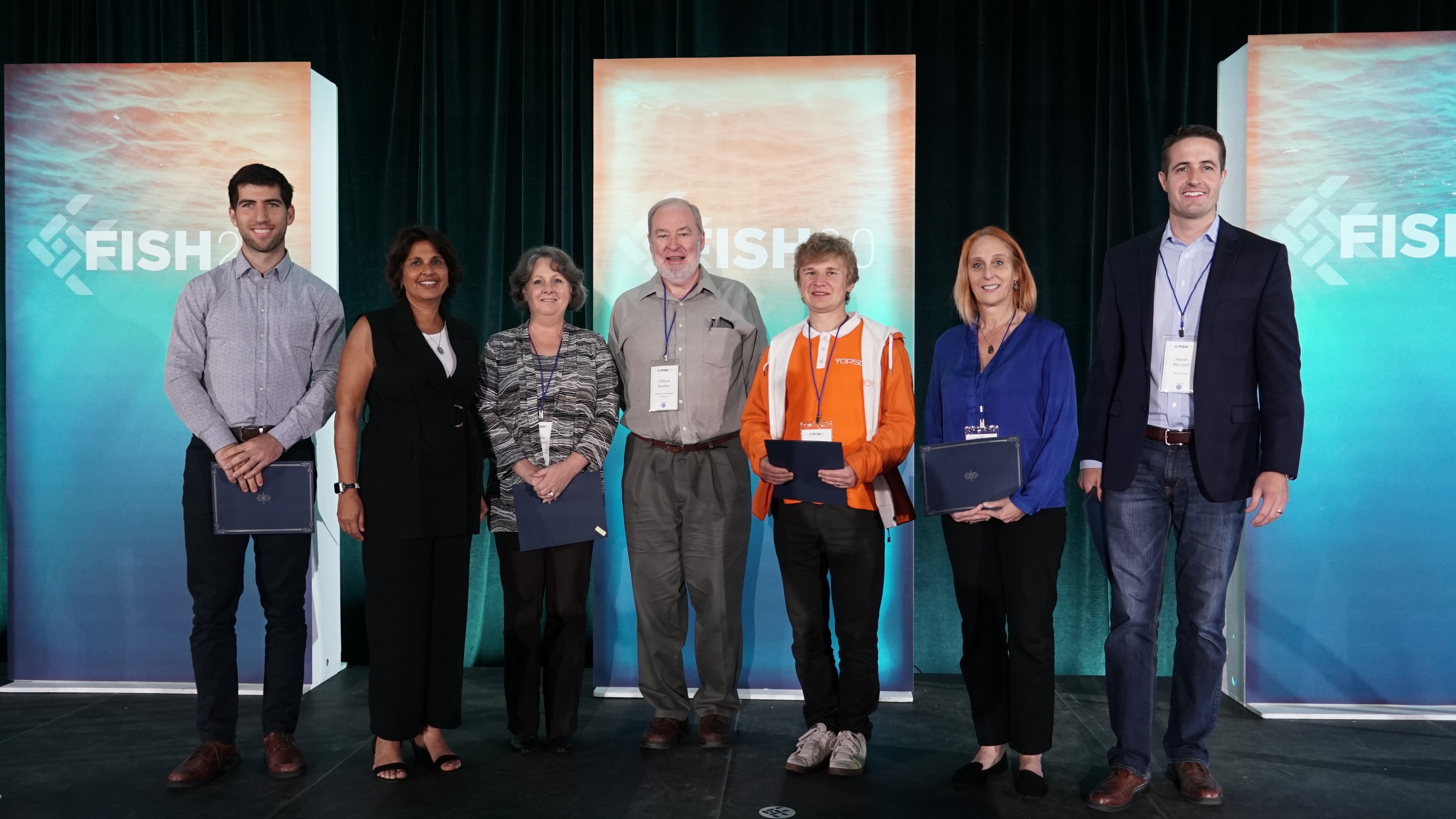The fourth Fish 2.0 Global Innovators Forum announced the six lucky winners of its final competition round earlier this week. A group of 200 investors, entrepreneurs, and aquaculture experts selected the winners by voting on presentations from 40 finalists. Most companies in the competition were at the operation and growth stages, according to Fish 2.0. Winners were announced at the fourth and final Fish 2.0 Global Innovators Forum in Stanford, California last week.
The 18-month program featured workshops with seafood businesses in addition to an online readiness assessment. Investors, businesses, and impact advisors provided feedback to each startup and assisted them with developing strategies to position their concept for investment. At least five investor judges scored each competitor during the semi-final round.
“I’ve seen more high-quality companies and presentations at this year’s Fish 2.0 Forum than at any previous one,” said Mitchell Presser of PE firm Freshfields Bruckhaus Deringer in a press release announcing the winners. “You get to understand the dynamics of the market here and you see a lot of opportunities, so you can evaluate the best and move forward.”
Some of the main themes that companies were tackling at this year’s event included bringing transparency to the supply chain with blockchain, new takes on fish-free feeds, solutions to cut carbon emissions and waste, online marketplaces, new seafood products, and alternatives to styrofoam packaging.
Here are this round’s lucky winners:
- Global Seafood: Fortuna, a Philippines-based company that claims its Fortuna Cooler is the first fish transport box made of natural, locally sourced materials. The durable cooler replaces polystyrene containers.
- US Seafood: Montana Microbial Products, which produces high-quality barley protein concentrates for fish feed, a new fish-free alternative to traditional feeds.
- Australian Seafood: Australian Crayfish Hatchery, whose state-of-the-art facility supplies antibiotic-free, pathogen-free hatchlings to farmers of the lobster-like crayfish in Australia and internationally.
- Aquaculture: Aquaai, whose Fish as a Service platform is based on a robotic fish outfitted with cameras and sensors that monitor conditions in offshore fish farms.
- Ocean and Seafood Technology: Yorso, an online B2B wholesale seafood marketplace that operates internationally and integrates with buyers’ and sellers’ CRM systems.
- Supply Chain Change: Wholechain, a user-friendly, blockchain-based traceability solution that provides transparency throughout the seafood supply chain.
The aquaculture startup ecosystem
Since its start in 2013, Fish 2.0 has worked with 588 entrepreneurs from more than 40 countries, built a network of over 700 investors, produced 27 investor briefings on topics ranging from algae products and aquaculture technology to traceability and tuna, and inspired 388 investors and experts to volunteer as advisors or judges to help sustainable seafood entrepreneurs develop their businesses, according to the program.
“When we launched Fish 2.0, few people saw seafood as an exciting sector for sustainable business innovation,” said Fish 2.0 founder and executive director Monica Jain. “We believed progress would accelerate if we could help investors and entrepreneurs build the knowledge and connections they needed to get promising ideas off the ground and move capital into the sector.”
The aquaculture space has seen an uptick in not only innovation but interest from investors as well, attracting $193 million in capital during 2016 alone. Last year, aquaculture-focused VC fund Aqua-Spark invested in the first accelerator dedicated to the space, The Hatch, while major agrifood corporate Cargill has launched digital tools to support its aquaculture business activities. With incredible challenges facing the seafood production space, including feed production and fish health, it should be no surprise that innovators and investors are flooding the space.
Why end Fish 2.0?
It is sad to see Fish 2.0 ending. Monica Jain, the founder, issued the following statement on why.
“Mission accomplished: we set out to prove that sustainable innovation in the seafood sector could thrive and accelerate if entrepreneurs and investors were connected and supported. I strongly believe that the mission of any project-based nonprofit should be to put itself out of business! I am truly happy to say that we have done just that. We’ve not only met, but far surpassed our original goals. When we launched Fish 2.0 in 2013 there were no organizations supporting seafood innovation, entrepreneurs were not connecting with investors, and investors did not know much about opportunities in the sector. Since then we’ve generated over 365 articles and published more than 25 investor insight reports, channeled over $300 million into participating companies, and worked with 588 entrepreneurs from more than 40 countries. We have also developed a broad, global and vibrant investor network for Fish 2.0. We created Fish 2.0 to grow the field, and we did. Our goal was never to be the only way for innovators to gain support and meet investors, but to highlight the tremendous opportunities in the sector. Now there are seafood accelerators, incubators and competitions all over the world.”





